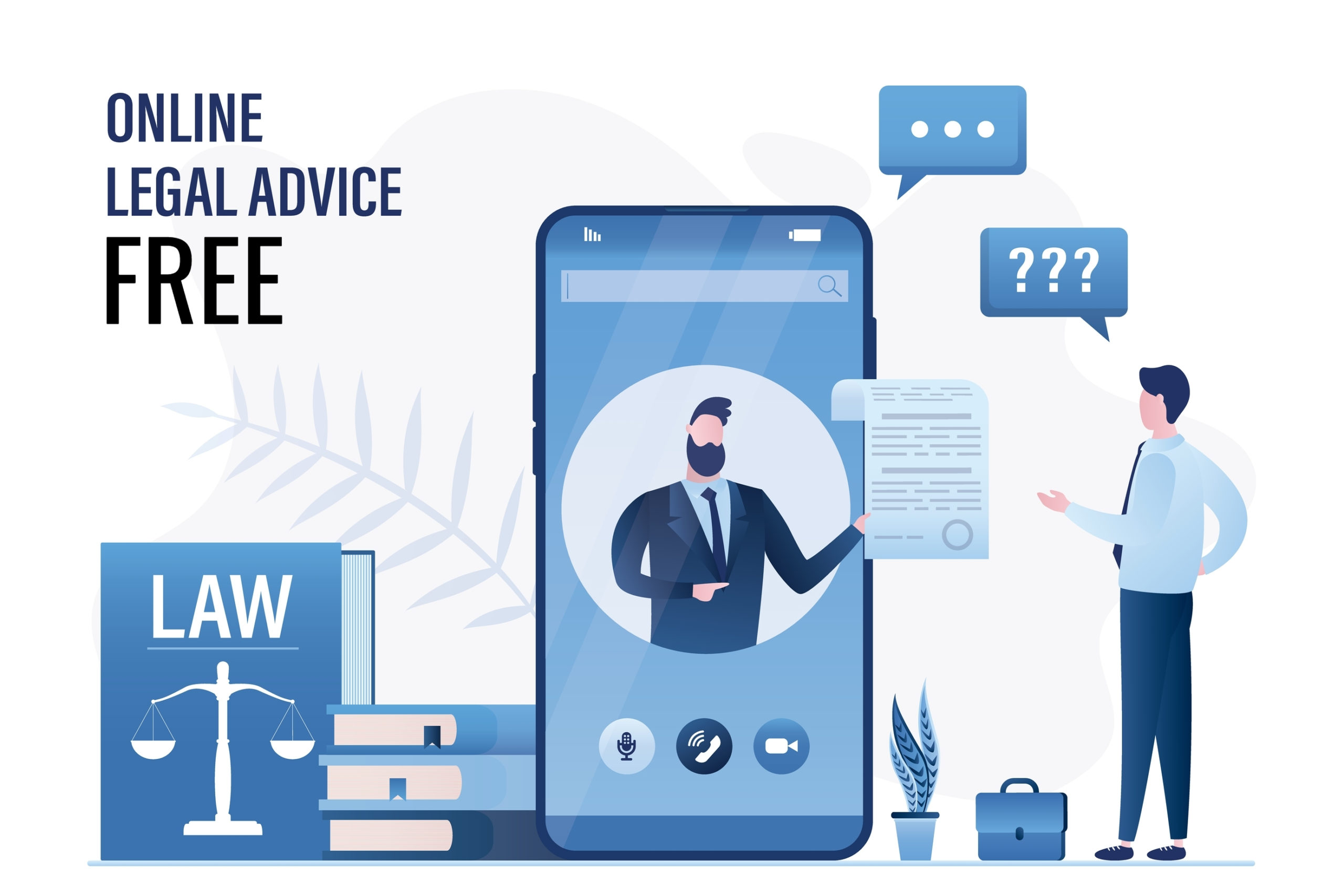Where To Get Free Legal Advice Online
Ever wondered how many people turn to the internet for legal advice they can’t afford in person? According to recent studies, countless individuals are navigating online platforms to bridge the gap between their legal needs and financial constraints. The digital age has provided an array of virtual legal services, making professional advice more accessible than ever before.
Sites like Avvo and Reddit’s LegalAdvice forum are revolutionizing how individuals can access legal counsel without cost. Historically, such resources were scarce, but with technology, the playing field is leveling. A staggering number of users, in fact, enjoy the benefit of free consultations, showcasing a trend towards democratizing legal knowledge globally.

The Rising Demand for Online Legal Advice
With technology making strides every day, the internet has become a go-to for many. People now seek legal advice online more than ever. Online platforms allow users to access information at their convenience. It’s a major shift from the days when a face-to-face meeting was the only option. This change allows more people to get the help they need without delay.
The reasons for this growing demand vary. For some, it’s the cost of hiring a traditional attorney. Online advice can be more budget-friendly. Furthermore, the convenience of browsing legal information without leaving home is appealing. People value the chance to explore options before speaking with a professional.
The popularity of online legal resources has led to more tools becoming available. Websites offer guidance on various topics, like family law or tenant rights. Many platforms now feature interactive elements. These include live chat or forums for personalized advice. Users can ask questions and get answers within minutes.
Yet, not all online sources are reliable. It’s important to verify information from trustworthy sites. Some users may find it useful to check reviews or ratings before settling on a platform. While online advice can be helpful, it’s often just a starting point. Legal assistance from licensed professionals remains crucial for complex issues.
The Shift to Online Platforms for Legal Aid
Over the past decade, there’s been a noticeable shift towards online platforms for legal advice. This transformation is largely due to the accessibility and ease these platforms provide. People can find legal help without leaving their living rooms. Such convenience was unheard of not too long ago. Today, it’s the new normal, reshaping how we think about legal services.
Several factors contribute to this trend. Cost is a major one, as online legal aid is often cheaper. Moreover, many people are comfortable navigating the digital world for answers. The web is a vast resource, offering solutions at the click of a button. For many, this beats waiting weeks for a consultation with a lawyer.
As more people turn to the internet, the range of services expands. Different websites offer specialized legal advice tailored to diverse needs. There are platforms focusing on various fields such as:
- business law
- immigration
- consumer rights
While online platforms provide opportunities to many, they aren’t without challenges. Users must sift through varying degrees of information quality. There’s a risk of outdated or inaccurate advice leading to potential issues. Therefore, it’s crucial to combine online insights with professional guidance when needed. Doing so ensures a more comprehensive understanding of legal matters.
Platforms for Free Legal Advice
A variety of online platforms offer free legal advice to help people navigate their legal concerns. These sites often provide easy access to information about common legal issues. Users can find guidance on topics like divorce, tenant rights, or small business laws. Many platforms maintain updated databases to ensure accurate information. This opens doors for individuals who might otherwise be unable to afford such help.
One popular platform is Avvo, which allows users to ask questions and receive responses from attorneys. It’s a quick way to get expert insights without any charges. Meanwhile, Reddit has a community called LegalAdvice, where members share their legal experiences. While it’s not a replacement for professional advice, it offers a sense of community support. There are plenty of others like LawGuru and Rocket Lawyer, each with its strengths.
Beyond forums and Q&A sites, some platforms offer interactive tools. These include templates and document creation features for various legal documents. Users can find samples of:
- contracts
- wills
- powers of attorney
Such tools help users create essential documents without the hassle of starting from scratch.
While these resources are valuable, it’s essential to verify their reliability. Checking reviews or recommendations can help determine trustworthiness. Users must ensure they understand the limitations of free platforms. For complex cases, consulting a qualified lawyer is always wise. By combining online resources with professional advice, individuals can make informed legal decisions.
Advantages and Disadvantages of Online Legal Advice
Online legal advice comes with several advantages. Firstly, it provides easy access for people living in remote areas. Without needing to travel, anyone can receive timely help. Cost savings are another benefit, as many online resources are free or cheaper than hiring a lawyer. These features make legal assistance more accessible to a wider audience.
Yet, there are notable disadvantages to consider. Online advice might not be as personalized as in-person consultations. This can lead to missed details that are crucial for a specific case. Additionally, there is a risk of encountering outdated or inaccurate information. It’s vital to cross-check any advice with reliable sources.
Despite these drawbacks, many appreciate the convenience of online advice. Speed is a considerable perk, as answers can come quickly, sometimes in real-time. This rapid response can be critical in urgent situations. However, the lack of personal interaction may pose challenges in complex legal matters. Important nuances could be lost without face-to-face communication.
For those seeking detailed insight, online platforms offer resources like articles, videos, and templates. These can help individuals prepare before meeting a legal professional. But such resources require the user to have some understanding of the legal language. Misinterpretation may occur, leading to potential complications. It’s always wise to use these as supplementary tools rather than a complete solution.
Online legal advice also faces limitations due to jurisdictional differences. Laws can vary significantly by location, and not every platform accounts for these differences. Users should be wary of general legal statements that might not apply everywhere. It’s crucial to check if the advice aligns with local laws. This precaution helps in avoiding assumptions that could lead to legal issues.
Important Things to Consider when Seeking Online Legal Advice
When seeking online legal advice, it’s crucial to verify the credibility of the source. Not all websites provide accurate or updated information. Always check if the advice comes from a reputable legal expert or firm. Reading reviews can help gauge the quality of the information provided. Ensuring reliability helps avoid potential legal pitfalls.
Understanding your specific legal needs is essential before seeking advice. Various platforms cater to different legal areas. Some focus on family law, while others may specialize in business contracts. Knowing your requirements ensures you find the right resources. This targeted approach saves time and enhances the relevance of the advice you receive.
Checking the jurisdiction is another vital step. Legal advice can vary by state or country, leading to discrepancies in the information. Make sure the platform you’re using caters to your specific legal area. Ensuring location-specific advice prevents potential jurisdictional misunderstandings. This step is critical for receiving applicable legal guidance.
It’s wise to use online advice as a starting point rather than the final word. While the internet can provide valuable insights, it cannot replace a qualified legal professional’s expertise. Complex cases often require personalized attention that only a licensed attorney can offer. Relying solely on online advice may not address all nuances of your situation. Balance online resources with professional consultations for comprehensive legal support.
Learning the basics of legal terminology can also be beneficial. A basic understanding helps in comprehending the advice provided online. Many platforms offer glossaries or explainers for common terms used in legal contexts. Familiarizing yourself with these terms can enhance your understanding. This knowledge empowers you to make informed decisions on legal matters.
The Future of Online Legal Advice
The journey toward integrating online legal advice into everyday life is undoubtedly promising. Experts agree that with technological advancements, access to legal resources will only improve. The potential to bridge the gap between legal assistance and those in need is immense. As digital tools continue to evolve, they will provide smarter and more personalized solutions.
However, the balance between online resources and traditional legal services remains critical. Professionals acknowledge that while digital platforms offer convenience, human expertise can never be fully replaced. It’s vital to continue fostering trust and reliability in online advice. Combining these elements ensures that individuals receive comprehensive and effective legal support.


